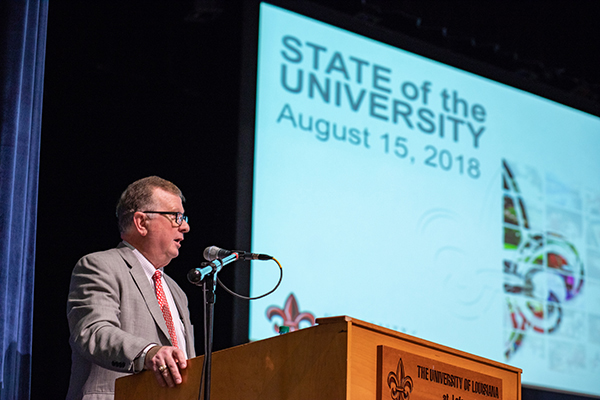The University of Louisiana at Lafayette continues to protect its academic core, set research records, make enhancements to campus and create new ways to generate revenue on the heels of a decade of state budget cuts to higher education.
More good news: State legislators ended the 2018 regular session and three special sessions with a stable higher education budget for the second consecutive year.
“Here’s what that means for us. After years of the most dramatic shift in revenue sources for higher education in Louisiana history, our state funding cuts have been halted – at least for now,” Dr. Joseph Savoie, UL Lafayette president, said Wednesday during his annual State of the University address to faculty and staff members. However, stable funding “doesn’t allow for much progress,” he said.
The University “must continue to become more self-sufficient to offset reductions and to fund needed improvements,” Savoie continued.
In fiscal year 2008-09, the state generated 66 percent of the University’s operating budget. That amount is now 28 percent.
“This year, state appropriations of $51.8 million will only comprise 15 and a half percent of our total revenue,” Savoie said.
The University has generated revenue through philanthropy, sponsorships and multimedia sales, research funding and patents, and auxiliary business activities to make up for the decrease in state funding.
Private gifts over the last year totaled more than $20 million, for example.
Research funding is another bright spot.
The University surpassed $100 million in research and development expenditures during the fiscal year that ended June 30, 2017. It was the first time it crossed that funding threshold. The $100 million in research and development expenditures places UL Lafayette among the top 25 percent of U.S. colleges and universities.
The milestone was reached on the strength of grants such as a $9.7 million award by the U.S. Department of Energy to establish the Tuscaloosa Marine Shale Laboratory at UL Lafayette. The multidisciplinary consortium is composed of geologists, petroleum engineers, geophysicists and economic development experts from UL Lafayette and other institutions. Research will focus on how to extract oil and gas from the massive geological formation that covers 28 parishes in central and south Louisiana, and several southwestern Mississippi counties.
The University continues to attract academically-gifted students. It implemented tougher academic standards in 2012.
Legislators fully funded the Taylor Opportunity Program for Students this year, although awards are capped at 2016-2017 tuition levels for each state university.
Enrollment numbers are still being finalized. However, Savoie said that the almost 3,000-member, first-time freshman class includes roughly 125 high school valedictorians. This class is expected to top a cumulative 3.4 GPA, which would set a record for an incoming class. It may also set a new composite ACT score record, just above 24.
“This is the most academically prepared class in the history of the University,” Savoie said.
The University’s freshman and sophomore retention rate – the percentage of students who enroll the next academic year – has remained steady at 75 percent.
Online enrollment has increased by 329 percent in the last four years, with 74 percent of the University’s more than 19,000 students taking at least one online course. “This is not a phase we are going through. This is a new reality,” Savoie said.
Savoie said a key component of attracting and retaining students is providing a “quality living and learning environment.”
The University has continued to invest in buildings and facilities through a self-funded capital outlay program created for campus improvements. Recent projects include renovations to McLaurin, Oliver, Stokes, Bittle and Guillory halls.
Construction recently began on “The Heritage at Cajun Village” – apartments for sophomores, juniors, seniors, and graduate students.
The complex will include five buildings with 591 beds on 12 acres at the corner of Johnston and East Lewis streets. One of the buildings that will front that intersection will have 4,883 square feet of retail space on its first floor, with apartments on the second and third floors.
The project will be funded with bonds that will be repaid with income generated through rent for the apartments and the retail space.
Work continues on Cypress Lake Plaza, which consists of improvements around Cypress Lake and the Student Union. The project is funded with self-assessed student fees.
The Maraist Financial Services Lab will be dedicated on Tuesday, Aug. 28. Using the latest technology, it will enable students to acquire hands-on experience in portfolio management, financial strategy and analysis. It will also provide data resources and statistical tools to enrich research opportunities.
Inside the lab, tickers will deliver up-to-the-second reports from Wall Street. Digital displays will flash breaking business news headlines. Students will learn, in real time, how financial markets work by utilizing state-of-the-art equipment to undertake projects similar to those that business professionals handle every day.
The Kathleen Babineaux Blanco Public Policy Center is being planned. It will house Blanco’s gubernatorial papers. It also will contribute interdisciplinary, independent research in several public policy areas Blanco championed, including criminal justice reform, poverty and economic opportunity, governmental ethics, and education.
“Amazing things are happening on our campus every day,” Savoie said.
“Lives and futures are being enhanced.”
